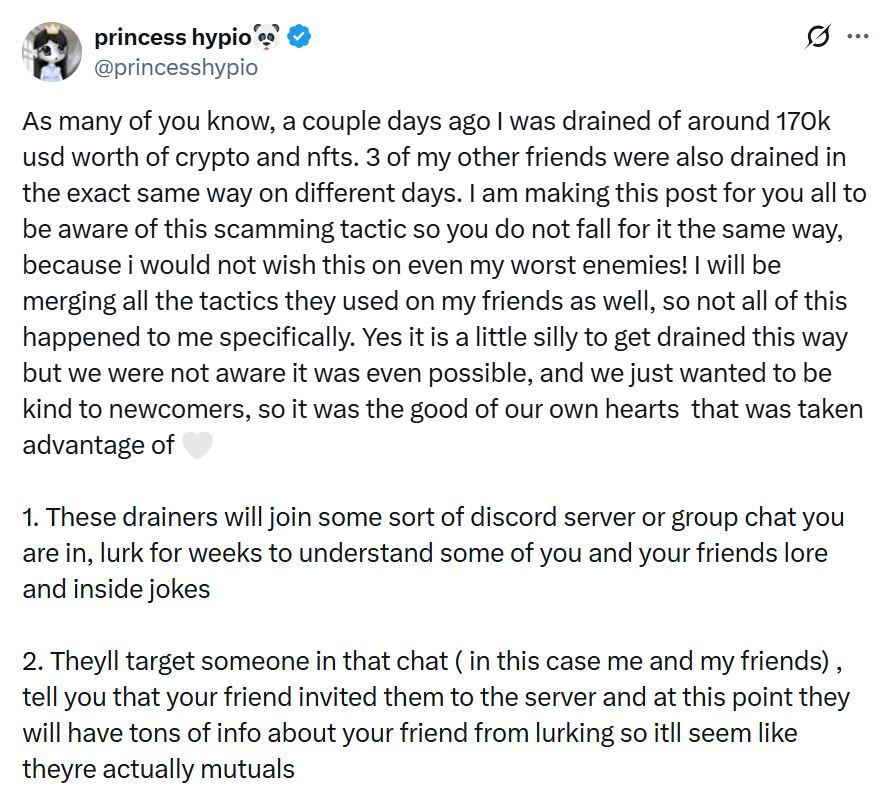Final month, crypto user and NFT artist Princess Hypio told her followers she misplaced $170,000 in crypto and non-fungible tokens after a scammer happy her to play a sport with them on Steam.
While she turned into as soon as “mindlessly” playing with the scammer, they were secretly stealing her funds and hacking her Discord. The identical tactic turned into as soon as extinct on three of her numerous chums, she wrote in a publish on Aug. 21 on X.

It turns out, the strategy has been around for some time and is identified by some as the “try my sport” scam, which customers were reporting for years in numerous forms.
Talking to Cointelegraph, Kraken’s chief safety officer, Cut Percoco, acknowledged these methods cling change into an an increasing selection of in fashion assault capability
“Are trying my sport” hack: The arrangement it with out a doubt works
The crypto version of the scam entails a hacker becoming a member of a Discord server or group, mendacity in wait, studying about how customers work alongside with every numerous and later using that records to regain belief.
The hacker then asks customers in the occasion that they procure crypto or NFTs, customarily feigning hobby to query questions and gauge what digital property they would well seemingly also honest procure. In Princess Hypio’s case, they had a Milady NFT, which resulted in her being centered.
After figuring out a purpose with crypto, the hacker invites victims to play a sport, sending a hyperlink to a server with Trojan malware that offers access to user devices, which permits them to steal personal records and drain any connected wallets.
In Princess Hypio’s case, the ploy involved convincing her to download a sport on Steam by offering to aquire it for her. The sport itself turned into as soon as protected, however the server on which the sport turned into as soon as being hosted turned into as soon as malicious.
She misplaced $170,000 from the assault, she acknowledged.
It comes very most life like days after Discord released its unfounded practices coverage explainer, warning that selling or accomplishing monetary scams on the social platform violates the phrases of use.
“These scams attain now not exploit code; they exploit belief. Attackers impersonate chums and stress of us into taking actions they customarily wouldn’t take,” acknowledged Percoco.
“The largest vulnerability in crypto is now not code, it’s belief. Scammers exploit neighborhood spirit and curiosity to take support of true intentions.”
Attackers embed themselves in communities, study the custom, mimic trusted chums, after which strike, he acknowledged.
Scammer tactic piquant previous crypto
In February, a user below the handle RaeTheRaven posted to the Malwarebytes discussion board they’d fallen prey to the “rude scam” after somebody they belief turned into as soon as a pal sent a hyperlink. A Reddit discussion board that started in July also warned of scams focused on avid gamers.

Percoco told Cointelegraph that while the crypto industry tends to witness these scams first, the strategy spreads across sectors.
He acknowledged the very most life like capability to preserve some distance flung from being snared is to cling a “healthy skepticism,” disclose identities by one other channel, preserve some distance flung from working unknown tool, and endure in mind that “doing nothing is safer than taking a unstable step.”
“If one thing feels rushed, generous, or too true to be true, it virtually constantly is. Attain now not belief, test.”
Faux recruitment campaigns even worse
Nonetheless, Percoco also acknowledged that while the Discord scams are on the upward push, a more popular fashion in crypto currently entails spurious recruiters.
In a fresh June case, a North Korea-aligned risk actor centered job seekers in the crypto industry with malware designed to steal passwords for crypto wallets and password managers.
“Discord impersonation is rising hasty, however the most popular fashion we are tracking nowadays is spurious recruitment campaigns where victims are lured with job offers and tricked into clicking phishing hyperlinks,” Percoco acknowledged.

